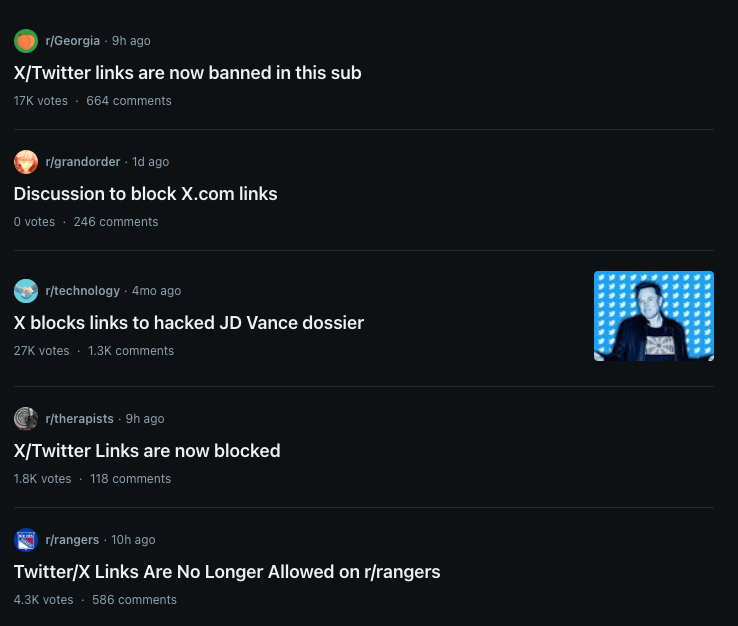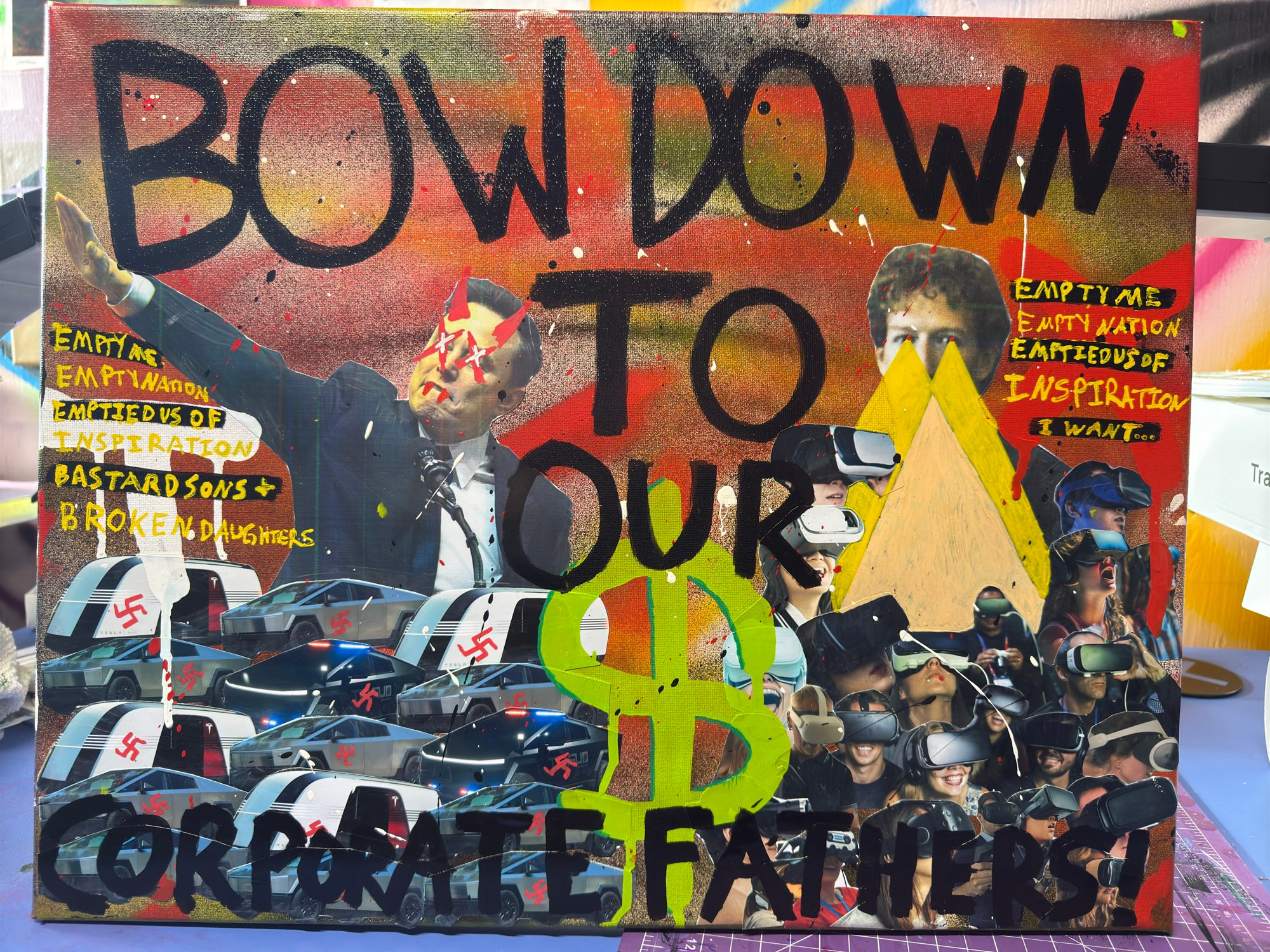We should have all banned Twitter links years ago.

We should have all banned Twitter links years ago
Look, I know tensions are very high right now. Things are pretty fucked up. The political issues need talked about and worked out. But now, more than ever, I think it’s absolutely crucial for us to re-evaluate social media as a phenomenon, how we engage with it, and the utility it provides (or takes away) from our daily lives or online discourse.
Context: Dozens of subreddits are banning Twitter/X links as a result of Elon Musk’s Sieg Heil salute during his inauguration.

Cool. Do it. After years and years of signs of Musk’s fall down the far and alt-right extremist rabbit hole and widely-alleged drug problem, the entire internet uniting in agreement (more than was already believed) that Twitter is now a Nazi-run platform is progress. For many, this is simply validation of what they’ve seen unfolding since Musk bought the company in 2022, and for others it’s the “final straw” as they give up hope that the formal globalized town square could ever return to its former glory.
The problem is, Twitter links should have virtually never been used as a source for anything in the first place.
[Due to the obvious relevance, I am focusing entirely on Twitter in my discussion here. However, the topic and stances I’m taking, rules I’m suggesting, etc. all apply to any similar style social media. Please evaluate everything you use.]
Twitter is not a source of information, news, anything except (arguably) gossip. If you want to share news, link the actual news article. If you want to share a status update from the latest AAA game publisher that’s laying off the developers of their just-released critical success game, link the blog post from the publisher. If you want to share a new hardware announcement, link the PR post from the company. The tweet was never supposed to be the source of the information, it was just supposed to be the notification blast that told you the information was available.
Much like when your local TV news anchor gives you the rundown of news stories they’ll be covering at 6PM, those brief headlines, teasers, hooks, whatever are not the news reporting themselves. They’re just a teaser. This is how social media posts were designed to be used. That is the role that the tool that was originally built was to fill.
“Status updates” they were called.
Yes, the tool evolved over time, and its users’ use of the tool with it. The tool became a platform and then it became a hyper-monetized hellscape (one of many in the inescapable landscape we find ourselves in online today) so glued to the attention economy that its owner bursts a blood vessel at the sheer thought that you might put your phone down and have a real, human conversation at any point throughout the day.
Direct messages, polls, featured replies, images, gifs and video, and threads – followed by paid-access long-form posting – took what was a micro-blogging tool and turned it into a social media communications hub of sorts. And while there were unquestionable benefit to this globalized channel wherein anyone from authors to A-list actors to the frontrunner for that 90s band you only know one song from, to your favorite YouTuber or TikTok content plagiarizer could be reached and interacted with – eventually we all kind of lost the plot. We took the hammer out of our toolbox, started using it as a shovel and a spatula and sex toy and forgot that it was only designed for one thing.
Technological tools can benefit our lives in many ways, and bring many benefits to everyone around the world, but only when they are used in the way they were designed. Once tools put on a mask and start to pretend to be places and want you to build your lifestyle around them so they can dominate every second of your every waking hour to drain the highest amount of ad revenue from your veins in a slow, excruciating drip… the relationship becomes unhealthy. The benefits soon outweigh the cons; and even though it seems impossible to leave, upon taking a break you’ll quickly realize you never want to return.
Regardless of its political affiliation or the number of lonely adults who can’t seem to uninstall it for fear of being alone with their thoughts the next time they have to sit on the toilet, Twitter posts should very rarely ever count enough as a source of something worth using as the primary link for. To use it as such represents a lack of understanding (or lack of exercising that understanding in practice) of primary versus secondary sources, the value of a valid source, and all those other little tech and media literacy things that come along with it.
Participating in this behavior, or encouraging it in your online spaces, is to be complicit in the shrinking of our collective media literacy capacity as a society and becomes a feedback loop of continuing to misunderstand and mis-use tools – and thus be less capable of choosing the right tool for the job (or finding quality sources about the next important topic or issue) later on.
I know, I make it sound so life or death when it’s not. Tech and media literacy is something I care deeply about, I believe to be close to the root of many of our issues in the current socio-political climate, and what I’m choosing to focus on when it feels like I can make absolutely zero difference in the shitstorm happening around me.
It’s okay if you’ve used a Twitter link as a source before. It’s okay if you’ve shared it to Reddit. The best we can do is try to do better moving forward and help each other understand why it’s a bad idea. I mean hey – at least you aren’t defending a freshly-inaugurated tech CEO-slash-government official for throwing up a Sieg Heil multiple times as he closed his speed, right?
And yes, of course there are exceptions to every rule. Obviously if you’re sharing something about specifically what someone said on Twitter, embedding, screenshotting, or linking that tweet is the most effective way to include the source in the conversation. I’d argue that we’d all be nowhere near as deep in this mess if we hadn’t spent the last 10 years caring so much about what anyone said on Twitter in the first place – but it is worth noting that there are technically scenarios where that act would make sense.
So yes, by all means please keep banning Twitter links from your subreddits, forums, communities, etc. My own Discord server (with similar philosophies applied on my forums and anywhere else) realized along the way that there really was no going back with Twitter and elected to have everyone try to prioritize direct links to sources/info whenever possible, or at the very least swap in alternate platform links to the same person’s post (BlueSky, Mastodon, etc.) in place of Twitter links.
There is no going back. The best time to stop supporting Twitter in any way was on October 17, 2022. The second best time is today.
Personally, I have officially declared [See: I used a Twitter link here ONLY because the link to the tweet was the only viable way to share this Twitter-specific post, ha] that my only posts on Twitter moving forward will be for work-specific posts until my existing contractual obligations are complete, at which point I will either be deactivating my Twitter profile or graveyarding it so no one can take my name.
Whatever reason is prompting you to stop allowing Twitter links is valid – but just consider the consequences of using ANY social media links as sources in the first place and consider better personal or community policies moving forward.
Part of why I held onto Twitter as long as I had was because I have an extensive network of colleagues and professional contacts in my DMs on the platform. I should have moved those contacts to more direct means of communication (text or chatting apps, email, anything else) long ago, but it’s hard to cut things off. FOMO hits hard. This both represents my own poor utilization of the tool and refusal to adapt to more appropriate tools for the job and how the modern tech space has really pushed these “everything platforms” to disrupt our ability to control our own experiences. If I can’t choose to leave a platform because I might miss out on friends or professional contacts, the platform wins.
Thankfully, there are experiences such as Mutahar from SomeOrdinaryGamers who recently shared his experiences, his FOMO keeping him on Twitter, and how leaving hasn’t negatively impacted his work. We need more of these conversations to happen so people can (slowly) realize these tools don’t own us as much as we might think.
Lastly, I want to encourage a bit of reading. Cal Newport’s “Digital Minimalism” (grab from AbeBooks or your local library) is a must-read for anyone trying to reclaim their life and take control back of their online existence. Even as someone who isn’t an Instagram or TikTok junkie, it’s been immensely helpful in me working through my dissonance with the state of tech and insightful as to how I can move forward. The core strategy of the digital minimalism philosophy is to both evaluate if a new (or existing, if re-evaluating) technology would have a significant positive impact on your life worth the negative effects it might bring, and to research and weigh if that specific tool is the best tool for the job for whatever you’re planning on doing with it.
I believe anyone re-evaluating their relationship with Twitter (or any similar social media) will quickly realize that it will not have a significant positive impact on their life and it is not the best tool for the job.
Twitter may be a place to have a conversation, but it doesn’t work for driving people to information. It’s already been demonstrated many times that Twitter does not drive traffic to other websites; and we’re doing the entire world a disservice by breeding dependence on such a centralized service that, if shut down overnight, many people would have no clue where to go or how to get their information elsewhere. We’ve already seen the impact of a Reddit blackout and the consequences of having our information and questions-and-answers delivery being too centralized, the same consequences apply to over-reliance on social media platforms as “sources” of information, too.
And again, remember that this is not exclusive to Twitter. Social media of any kind has these same problems with regards to not being valid sources and not being a good idea to focus on for information or news. So while I’d strongly recommend moving to more ethical, small-web style social media platforms (such as Mastodon, BlueSky kinda, and PixelFed) just replacing Twitter in your bad habits will not net a truly positive change in the grand scheme of things. Buying a shiny new hammer to still use as a spoon or toilet plunger doesn’t make it any smarter of a choice than the last hammer.
We should have all banned Twitter links years ago – and all social media links should follow suit. It shouldn’t have taken blatant Nazi saluting for us to have gotten to this point.
Stay safe out there. Fuck nazis.